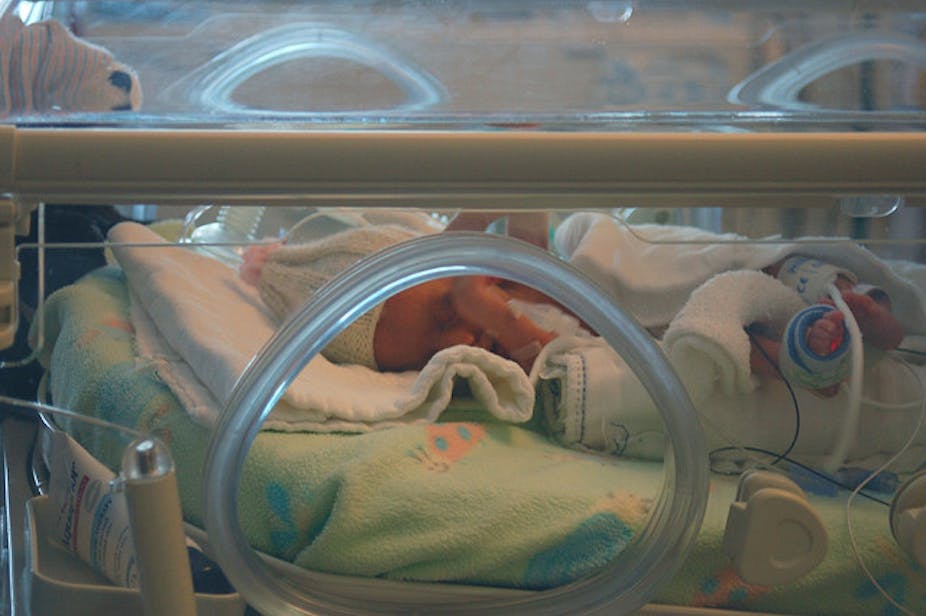Imagine how frightening it must be for a woman to go into labour when she is just over halfway through her pregnancy and her baby has only had 23 or 24 weeks to grow. She and her family are overcome with fear, uncertainty and helplessness.
But when well-meaning relatives recount articles they’ve read in women’s magazines about “miracle babies”, the family can become buoyed with unrealistic hope about what neonatal medicine can offer.
While the survival of these tiny, desperately fragile human beings can legitimately be described as “miraculous”, the reality that glossy magazines don’t mention is that a very high percentage will go home with lifelong physical and intellectual deficiencies which they and their family will endure with limited community support services. So one person’s miracle might be another person’s tragedy.
During the labour, a neonatal specialist and neonatal nurse visit the expectant parents and explain the possible outcomes. Neurological outcome and risk of disability are most critical, with life-long implications for their family if the baby survives.
Disability can range from mild to moderate all the way to severe, which means the child will require a high level of life-long care, depending on the amount of organ damage, particularly to the brain.
Depending on the period of gestation, the couple will be asked if they would like the baby resuscitated when it is born. Statistics about the outcomes for babies of extreme prematurity are sobering. Generally, birth before 26 weeks of gestation is associated with a high incidence of neurological and developmental disability in the first two years of the child’s life.
And the more premature, the higher the risk of severe disability. So you can understand why expectant couples hope or believe their baby won’t be one of these statistics.
If the labour cannot be stopped, a tiny infant is delivered. This baby might weigh between 500 and 600 grams. If he or she is resilient enough to be admitted to the neonatal intensive care unit (NICU), one hurdle has been overcome but there are many more to follow.

Society has come too far to just let these marginally viable babies die, but there are times when the best interests of the baby are not served by being kept alive – especially when it’s clear the baby will die regardless of the care it receives and the high-tech interventions that are used. Neonatal medicine cannot save all babies.
At a time when they are vulnerable, exhausted, emotional and frightened, parents are asked to make important decisions that they will have to live with for the rest of their lives. This is meant to be an objective task, but is any parent able to be objective about their child? Other people’s children, yes, but surely not their own.
What parents generally want to know is what extreme prematurity means for the baby’s survival and quality of life, or the amount of time until death. Unfortunately, these things are not known and the questions can only be answered with generalisations and references to statistical probabilities which leave the parents with an uncertain prognosis.
It must be agony for parents to have to make these decisions about a much-loved baby: whether to start treatment; when to remove life support. But it’s essential that the people most affected by any decisions are part of the decision-making team.

My PhD thesis explored the ethical issues Australian neonatal nurses faced when they cared for the smallest and most fragile of babies – those 24 weeks gestation and less. It’s titled “Balancing hope with reality” because this is what the neonatal nurses do – they hope for a positive outcome but they expect the worst because this is what they’ve seen in the past. For the parents, I would suggest a similar balancing act.
It’s no longer enough to push the envelope of viability and keep babies who are born at 24 weeks or less alive just because it’s possible to do so, without thinking about the ramifications of the survival of the baby on the family and society. The reality is that babies of extreme prematurity suffer from their premature births.
Technology has given clinicians greater opportunities to save tinier babies but even with these technological advances, there have not been any major changes to the rates of disability in the past 10 years.
Families need help and support to understand the implications of their heart-breaking decision of whether or not to resuscitate their extremely premature baby. And if they proceed, it’s important that they’re helped and supported to deal with the ongoing problems of prematurity so their child can achieves his or her potential.

